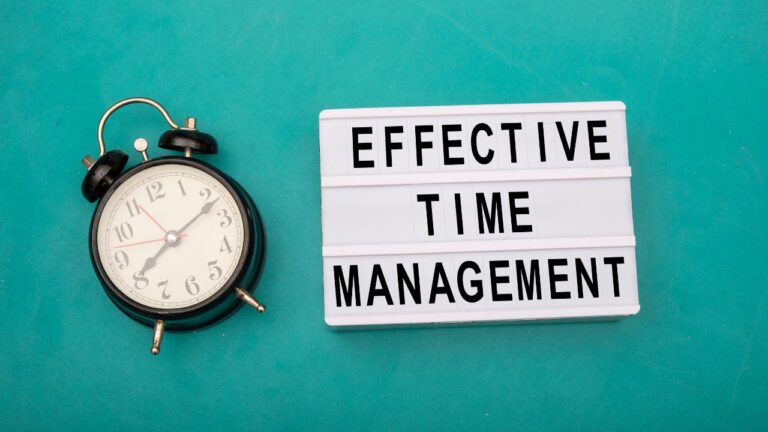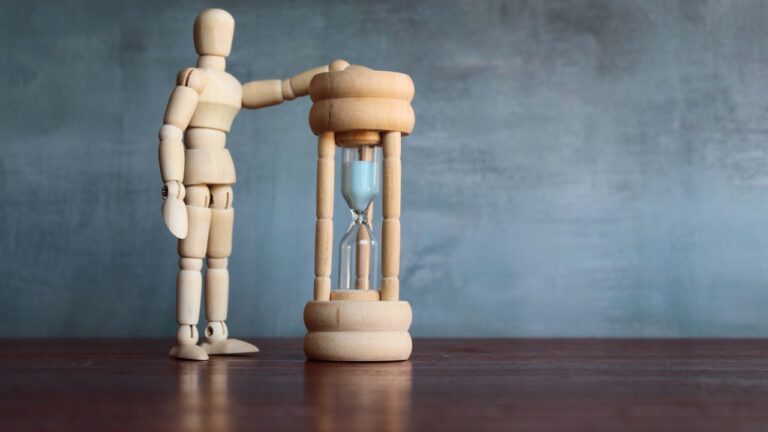Say Goodbye to Procrastination With These 8 Tips
I've struggled with procrastination for years, and I know firsthand how it can drain your productivity and increase stress. Through extensive research and personal experience, I've uncovered that conquering procrastination isn't about willpower alone—it's about implementing proven strategies that work with your brain's natural tendencies rather than against them. If you're tired of pushing important tasks aside and feeling overwhelmed by looming deadlines, I'm here to share eight practical tips that have helped me change from a chronic procrastinator into someone who consistently gets things done. Let's investigate how you can make this shift, too.
Key Takeaways
- Break large tasks into smaller, manageable chunks to reduce overwhelm and make starting easier.
- Create a dedicated, distraction-free workspace with minimal clutter and notifications turned off.
- Set specific, non-negotiable deadlines and treat them as firm commitments to maintain accountability.
- Find an accountability partner or group to share goals and increase follow-through by up to 65%.
- Practice mindfulness techniques and positive self-talk to combat negative thought patterns that fuel procrastination.
Break Tasks Into Smaller Chunks
Life's biggest challenges become more manageable when broken down into bite-sized pieces. When I help people with overcoming procrastination, I always recommend they break tasks into smaller chunks. This simple yet powerful strategy can alter an overwhelming project into a series of achievable steps.
I've found that when you break down a large task, you'll experience fewer negative feelings about getting started. Instead of facing one huge mountain, you're looking at several small hills that you can climb one at a time. This approach also improves your time management skills, as you can better estimate how long each chunk will take to complete.
When completing a task chunk by chunk, I suggest you celebrate each small victory. These mini-celebrations elevate your confidence and motivation, making it easier to tackle the next piece.
I recommend starting with the most challenging chunk first – what's often called "eating the frog." This builds momentum and makes the rest of your tasks feel lighter. Remember to set specific deadlines for each chunk, as this creates a sense of urgency and helps maintain your focus throughout the project.
Create Your Optimal Environment
Beyond breaking tasks into manageable chunks, your physical environment plays a powerful role in defeating procrastination. I recommend designating a specific workspace where you can focus solely on your tasks without interruptions. Studies show that a clutter-free environment can reduce mental overload by up to 30%, so keep your area neat and organized.
Start by turning off notifications on your phone and using website-blocking apps during your work sessions. This simple change can enhance your task engagement by about 25%.
Next, make certain your workspace has proper lighting and comfortable seating to maintain your energy and concentration throughout the day. I've found that adding a few plants or inspiring quotes can greatly improve your mood and productivity while working.
Keep a visible to-do list on your desk to track your progress and maintain momentum. Visual cues help you stay on course and complete tasks on time.
Remember to organize your materials efficiently, keeping frequently used items within arm's reach and removing anything that might distract you. By optimizing your environment this way, you'll create a space that naturally promotes focus and reduces the urge to procrastinate.
Start With The Hardest Task
When facing your daily tasks, tackling the most challenging one first – often called "eating the frog" – can change your entire productivity cycle.
I've found that this approach is one of the most effective strategies to overcome procrastination, as it helps you utilize your peak energy levels during the morning hours.
Let me explain why starting with the hardest task makes such a difference. When you complete your most challenging work first thing, you'll experience an immediate increase in mood and confidence that carries through the rest of your day.
I've noticed that this momentum creates a positive spiral, making other tasks feel considerably easier to handle.
Rather than letting anxiety build up throughout the day, I recommend diving straight into your biggest challenge. Your morning mental clarity is an essential resource, and using it on your most demanding task guarantees you're operating at maximum efficiency.
Build Accountability Through Social Support
Building on the power of morning productivity, another potent strategy for beating procrastination involves leveraging your social connections. I've found that sharing your goals with others creates a powerful system of accountability that can greatly enhance your chances of success. When you tell someone about your intentions, you're 65% more likely to follow through on them.
I recommend finding an accountability partner who'll check in with you regularly and help you stay on track. This could be a friend, family member, or colleague who understands your goals and can provide the social support you need when motivation wanes. Together, you can identify procrastination triggers and develop strategies to overcome them.
You might also consider joining a group or community with similar objectives. Whether it's a study group or professional network, surrounding yourself with like-minded individuals creates an environment of mutual accountability.
I've seen how this shared commitment helps members stay focused and celebrate achievements together. When you're feeling stuck, these connections provide the encouragement and positive reinforcement needed to push through challenges and maintain momentum toward your goals.
Set Clear Time Boundaries
Drawing from years of experience, I've uncovered that setting clear time boundaries is one of the most effective weapons against procrastination. When you establish specific deadlines for each task, you create a structured system that naturally pushes you toward completion and reduces the urge to delay.
I recommend treating your deadlines as non-negotiable commitments, just like you'd a doctor's appointment or important meeting. Set internal deadlines that fall a few days before external ones, giving yourself a buffer for unexpected challenges. For instance, if a project is due on Friday, make your personal deadline Wednesday afternoon.
To maximize your productivity, regularly review and adjust your time boundaries. I've found that blocking specific hours for focused work helps create a sense of urgency and accountability.
Start by breaking down larger tasks into smaller segments with their own mini-deadlines. This approach not only makes the work more manageable but also provides clear checkpoints to track your progress.
Remember to stick to your scheduled time blocks, as consistency reinforces these boundaries and strengthens your resistance to procrastination.
Reward Progress Consistently
Once you've established strong time boundaries, you'll need a convincing reason to stick with them. I've found that creating a reward system linked to task completion can make a significant difference in how you approach your work, helping you procrastinate less and stay focused on the task at hand.
Research shows that immediate rewards work better than waiting for distant benefits, so I recommend starting small. Try treating yourself to your favorite snack or taking time for a quick break after completing each segment of work.
You can also create a point system where you earn rewards for finishing tasks, building toward larger incentives that motivate you to maintain momentum. By celebrating small victories along the way, you'll reduce unnecessary stress and create positive associations with your work.
I've seen that people who reward progress consistently are 33% more likely to maintain their productivity over time. Consider setting aside dedicated time for enjoyable activities as milestone rewards.
This approach alters work into a more positive experience, making it easier to stay committed to your goals and complete tasks efficiently.
Manage Your Energy Levels
Your energy levels consistently shape your ability to tackle tasks and overcome procrastination. When I'm feeling drained, I notice how quickly simple tasks become overwhelming, leading to missed deadlines and unnecessary stress. That's why I've learned to prioritize energy management as a key strategy in fighting procrastination.
I start by getting 7-9 hours of sleep each night, which helps me maintain steady focus throughout the day. I've also found that incorporating regular exercise, even just a 30-minute walk, greatly enhances my energy and motivation to tackle challenging tasks.
When it comes to nutrition, I make sure to eat balanced meals with plenty of whole grains and proteins to avoid energy crashes. During work sessions, I use the Pomodoro Technique to maintain high energy levels. Taking short breaks every 25 minutes helps me stay fresh and focused when I return to the task you need to complete.
I've realized that managing my energy isn't just about powering through work – it's about working smarter by aligning my most demanding tasks with my peak energy periods.
Replace Negative Self-Talk
The way we talk to ourselves can make or break our productivity. When I catch myself falling into negative self-talk patterns, I've learned that altering these thoughts is essential for beating procrastination. Instead of berating myself with phrases like "I'm so lazy" or "I'll never get this done," I practice self-kindness by reframing these thoughts into more supportive messages.
I've found that using positive affirmations helps rewire my brain for action. Rather than saying "I should write," I tell myself "I am a writer," which builds my self-efficacy and motivates me to act consistently.
I also make it a habit to pause and notice when I'm engaging in self-criticism, using mindfulness techniques to interrupt these unproductive thought patterns.
When you find yourself procrastinating, try this simple exercise: Write down your negative thoughts, then create positive alternatives for each one. For example, replace "I'm terrible at this" with "I'm learning and improving."
This shift in self-talk isn't just feel-good psychology – it's a practical tool that research shows can greatly enhance your ability to tackle challenging tasks.
Conclusion
Beating procrastination isn't an overnight process, but I've found that implementing these eight strategies can lead to lasting change. I encourage you to start with one technique that strikes a chord most and gradually incorporate others into your routine. By breaking tasks down, creating the right environment, and maintaining positive self-talk, you'll develop better habits. Remember, small steps forward are still progress toward your productivity goals.






